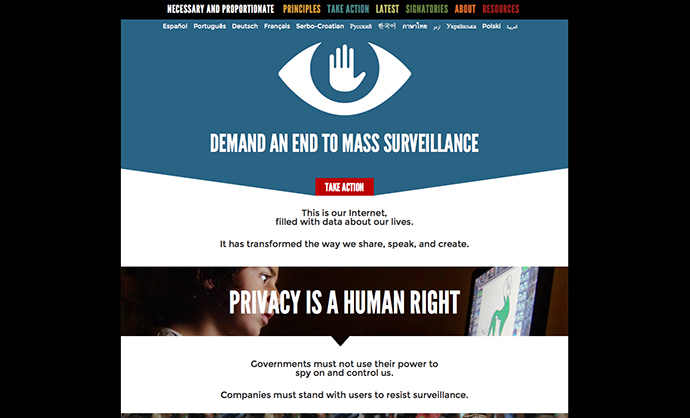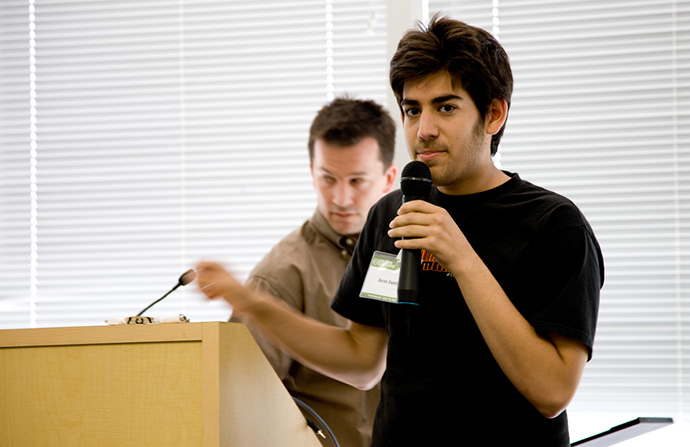‘The day we fight back’: 6,000 websites protest surveillance, honor Aaron Swartz
More than 6,000 websites, including Reddit, Tumblr, Mozilla, are taking part in an online protest against government surveillance. The action marks two years since website blackouts against SOPA and PIPA and commemorates Aaron Swartz’s death.
The February 11 online protest, going by the title ‘The Day We
Fight Back’, is supposed to see around 6, 200 websites each host
a large banner at the top reading “Dear internet, we’re sick of
complaining about the NSA. We want new laws that curtail online
surveillance.”
The banner enables US internet users to contact members of
Congress directly via email or a computer telephone call link
using Twilio Voice. They would then be able to ask legislators to
oppose the FISA Improvements Act, which would strengthen
the NSA surveillance legality and to support the USA Freedom
Act, that would, conversely, curb the
domestic surveillance power of intelligence agencies.
As for website visitors from outside US, they are urged to sign a
petition in support of the principles against mass surveillance.
The petition has already been signed by more than 100,000 people.
In addition, everyone is encouraged to change their social
networks’ profile pictures, adding a #STOPTHENSA tag to them.
http://t.co/fvCphLKD2z has officially begun. #stopthensa
— TheDayWeFightBack (@DayWeFightBack) February 11, 2014
“Together we will push back against powers that seek to observe, collect, and analyze our every digital action,” states the movement’s website. “Together, we will make it clear that such behavior is not compatible with democratic governance. Together, if we persist, we will win this fight.”
The protests are not confined to the instantaneous, infinite and easily accessible realm of cyberspace. Over a dozen protest events are taking place worldwide from Denmark, Costa Rica and Serbia to Stockholm, with street theater taking place in some US cities. San Francisco is seeing masses of people aiding in the projection of an anti-surveillance image onto the side of an AT&T building as a speech is given by one of its former technicians, whistleblower Mark Klein.
More than 130,000 emails have been sent to Congress to protest the NSA's mass surveillance, the organizers claim, while activists gather on Capitol Hill demanding a halt to the spying.
Activists with @demandprogress, @codepink & @BORDC gather on Capitol Hill on #TheDayWeFightBack to say #StopTheNSApic.twitter.com/AVpHeEx6Wd
— Alice Ollstein (@AliceOllstein) February 11, 2014
Electronic Frontier Foundation gave instructions on how to reach out to Congress with the text of the message. The campaigners say that Congress is getting over 7,000 calls an hour.
Congress is getting over 7,000 calls an hour to #StopTheNSA. That's over 58,000 today. Awesome. Don't stop: https://t.co/o5uMRYBsRg
— TheDayWeFightBack (@DayWeFightBack) February 11, 2014
The Executive Director of Demand Progress, David Segal said,
"Today the greatest threat to a free internet, and broader free
society, is the National Security Agency's mass spying regime.
"If Aaron were alive today he'd be on the front line,
fighting back against these practices that undermine our ability
to engage with each other as genuinely free human beings,"
International Business Times reports.
"I'd like you to work to prevent the NSA from undermining
encryption standards and to protect the privacy rights of
non-Americans," the script reads.
The day of online protest is “in celebration of the win against SOPA and PIPA two years ago.” Back
then thousands of websites, including Wikipedia, Reddit and
Flickr, went ‘dark’ to protest the bills, which were supposedly
written to protect copyrighted material and which many believed
would cripple the freedom of the internet.
The Day We Fight Back is also in memory of Aaron Swartz, a 26 year-old information transparency
activist, who took his own life just over a year ago, having
faced a standoff with the government.

When he was just 14, tech prodigy Swartz helped launch the first
RSS feeds. By the time he turned 19, his company had merged with
Reddit, which would become one of the most popular websites in
the world.
But instead of living a happy life of a Silicon Valley genius,
Swartz went on to champion a free internet, becoming a political
activist calling for others to join.
“This isn’t something playing out on stage somewhere where
big giants fight each other and you’ve got to sit and munch
popcorn,” Swartz said in one of his interviews. “This is
a fight you can join in. So if you go to domain progress.org and
sign up, we’ve got actions every week. There are bills that are
coming up that could crack down on internet freedom, companies
trying to abuse their power. And it’s up to all of us to stop
them.”
Aaron Swartz drew the FBI’s attention in 2008, when he downloaded
and released about 2.7 million federal court documents from a
restricted service. The government did not press charges because
the documents were, in fact, public.
He was arrested in 2011, for downloading academic articles from a
subscription-based research website at his university – with the
intention of making them available to the public. Although, none
of what he downloaded was classified, prosecutors wanted to put
him in jail for 35 years.

Friend and Harvard law professor Lawrence Lessig, later described
how the persecution had driven Swartz to the edge.
“When he saw all of his wealth gone and he recognized his
parents were going to have to mortgage their house, so he can
afford a lawyer to fight a government that treated him as if he
were a 9/11 terrorist, as if what he was doing was threatening
the infrastructure of the United States. When he saw that and he
recognized how incredibly difficult that fight was going to be,
of course he was depressed.”
#TheDayWeFightBack so far: Petition signatures: 125,412 Congress Calls placed: 22,256 Emails sent: 62,304 Join us: http://t.co/8JNgyKTDYB
— Kim Dotcom (@KimDotcom) February 11, 2014
Civil liberties advocates are now pushing for Congress to reform
the anti-hacking law the government used to pursue Swartz .
Parker Higgins from the Electronic Frontier Foundation believes
there's still a lot to be done before politicians realize such
relentless persecution is unacceptable.
“Unfortunately the government hasn’t changed its perception
here,” Higgins told RT. “There was a proposal last year
in the US legislature called ‘Aaron’s law’ that would address
some of the biggest concerns that we have. But Aaron’s law still
hasn’t advanced to the point where it’s passed or can be signed.
In fact we’ve seen proposals to make our computer crime laws even
harsher. And that’s something we need to keep working on until
politicians who don’t have a great grasp of how technology works
understand that this kind of persecution is unacceptable.”














